Books
Books
in random order

Saint is its/Conviction
13 poems of various length.
"I have used a procedure to write them and I am happy to share it, but it isn't what's most important about these poems. The subject matter that, I eventually realised, they share to the extent of justifying bundling them up in one pamphlet is religiosity, what stands between belief and act, be it faith or trust."

NIGHTNIGHT
In collaboration with Laurent Poleo-Garnier, NIGHTNIGHT is an archive of images and texts from different sources addressing the theme of the night. Over the book as a party that degenerates with fatigue, alcohol and other stimulants, images and layout deteriorate, the subjects get tired, the vision is cloudy...

The Spiritual Hunt
A long lost poem purportedly by Rimbaud is finally made available in English.
Referenced only in a few letters of Paul Verlaine, The Spiritual Hunt is Arthur Rimbaud's forgotten masterwork, a poem in five parts that explored the mystic philosophy that guided the young poet's heart and hand. Considered lost for years, a typewritten manuscript appeared in Paris in the late 1920s, circulating around a close-knit group of booksellers, poets, and playwrights. Yet it wasn't until 1949 that Mercure de France took the initiative to publish the unauthenticated galley and unleashed a literary controversy that shook France. Sides were drawn, with Andre Breton leading the charge of forgery, calling the work an utter hoax, and others defending it as legitimate and an essential key to understanding Rimbaud and his work. Bookstores were raided for copies, critics were skewered in journals, and tempers flared on radio and in print, but no conclusive judgement could be drawn and Mercure de France withdrew the work from publication and pulped all the copies they could find.
Now, seventy-five years after its initial imbroglio, The Spiritual Hunt is available in English for the first time with a facsimile letterpress edition of the original. Featuring Pascal Pia's original introduction along with an edifying afterword by translator Emine Ersoy.

Deviant Propulsion
Delving into the center of the endless webs of repression against our bodies, desires, politics, and imaginations, are those whose actions and motion cut away at the systemic limitations of society–this collection of poems was written with the inspiration and work of these people in mind.
As a working class queer poet, Conrad has had to fight through different stratifications of oppression his entire life. His poems vibrate with the flamboyant desire that manifests itself in queer culture, where the right to act on basic desires can become a battleground, and everyday acts of love and devotion must be enacted as a political form of defiance. Deviant Propulsion is dedicated to the elimination of fear. The title refers to the idea that those who are deviant propel the world forward at top speed. The poems that emerge from this life-long struggle illustrate the sharp edge of that defiance and desire, where joy is closely linked to death. In a world ruled by those who govern with fear, and in a landscape barbed with those who are terrified of desire, moving at speed of deviants is the only way to transform potential into action, and desire into positive change.
CAConrad is the author of nine books of poetry and essays, including their latest book JUPITER ALIGNMENT: (Soma)tic Poetry Rituals and While Standing in Line for Death, which won a Lambda Book Award. A documentary about their work, The Book of Conrad, is viewable online on their website.
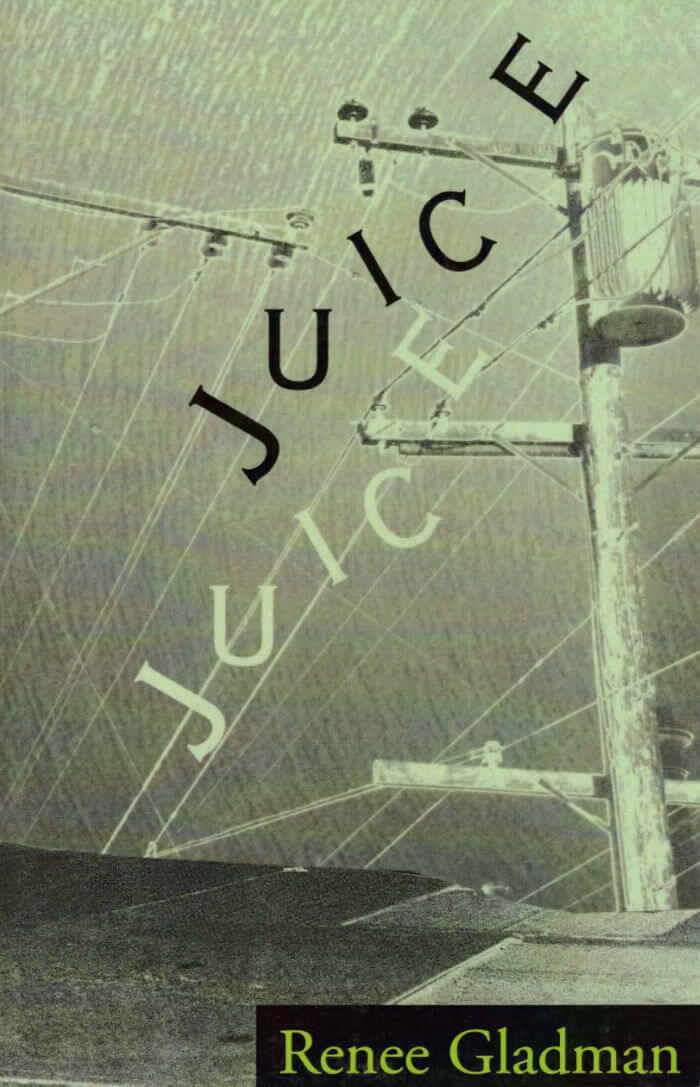
Juice
Juice is Renee Gladman's first full-length book. Gladman wields an idiosyncratic skill with description and characters that draw praise and attention from her contemporaries. Juice describes a world where seemingly minor obsessions and details (like the narrator's almost random preference for juice) can structure and develop an entire story, down to its tone and style. As her narrator puts it: "So far it has been sex and leaves that keep me alive."
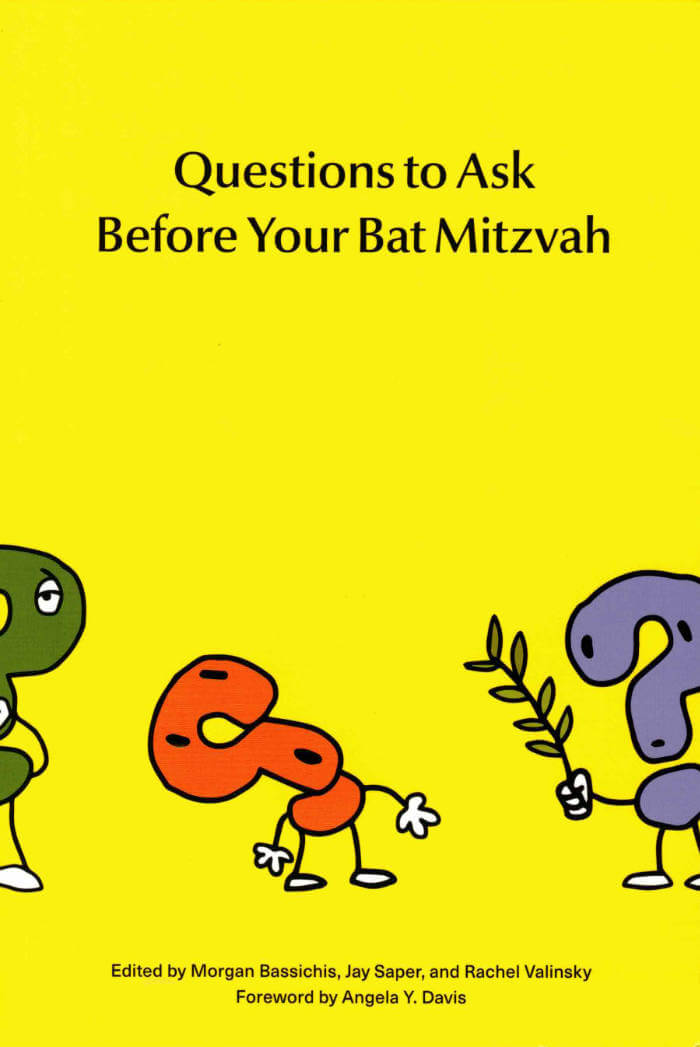
Questions to Ask Before Your Bat Mitzvah
Questions to Ask Before Your Bat Mitzvah invites 38 writers, artists, scholars, and activists to offer accessible reflections on 36 questions to help young Jews—and anyone else who picks up this book—feel grounded in the Jewish radical tradition, unlearn Zionism, and deepen their solidarity with Palestinians, offering the B’nai Mitzvah as an opportunity for political awakening open to all. Edited by comedic performance artist and activist Morgan Bassichis with artist and educator Jay Saper and writer Rachel Valinsky, with a foreword by seminal scholar-activist Angela Y. Davis, and illustrations by the artist Nicole Eisenman, this essential volume offers an accessible and challenging set of personal and collective responses to critical questions for our time.
Questions included range from “What even is a Bat Mitzvah?” and “I’m queer/nonbinary/secular/old/not even Jewish—are Bat Mitzvahs for me?” to “Why are there Israeli and American flags in my synagogue?” and “Why do people plant trees in Israel as a Bat Mitzvah gift?” and “What does the olive tree symbolize to Palestinians?” and “What does the watermelon symbolize to Palestinians?” and “What do Palestinian kids do when they turn thirteen?” and “How do I talk to my family about this stuff?”

We Want Everything
It was 1969, and temperatures were rising across the factories of the north as workers demanded better pay and conditions. Soon, discontent would erupt in what became known as Italy’s Hot Autumn. A young worker from the impoverished south arrives at Fiat’s Mirafiori factory in Turin, where his darker complexion begins to fade from the fourteen-hour workdays in sweltering industrial heat. His bosses try to withhold his wages. Our cynical, dry-witted narrator will not bend to their will. “I want everything, everything that’s owed to me,” he tells them. “Nothing more and nothing less, because you don’t mess with me.”
Around him, students are holding secret meetings and union workers begin halting work on the assembly lines, crippling the Mirafiori factory with months of continuous strikes. Before long, barricades line the roads, tear gas wafts into private homes, and the slogan “We Want Everything” is ringing through the streets.
Wrought in spare and measured prose, Balestrini’s novel depicts an explosive uprising. Introduced by Rachel Kushner, the author of the best-selling The Flamethrowers, We Want Everything is the incendiary fictional account of events that led to a decade of revolt.
Translated by Matt Holden
Introduction by Rachel Kushner

For Chris Mann (Open Space Magazine #22)
Dorota Czerner, Elaine Radoff Barkin
Special issue of this US magazine dedicated in its entirety to the late Australian artist/compositional linguist/raconteur Chris Mann, who died in 2018. The magazine contains tributes from Mann associates and admirers, including Warren Burt, Amanda Stewart, Pi-0, Ronald Robboy, Linda Kouvaras, Alvin Lucier, Ruark Lewis, Annea Lockwood, as well as Mann’s own writing and an interview with him by Philip Blackburn.
88 pages bound in soft-cover glossy colour cover by Brigid Burke.
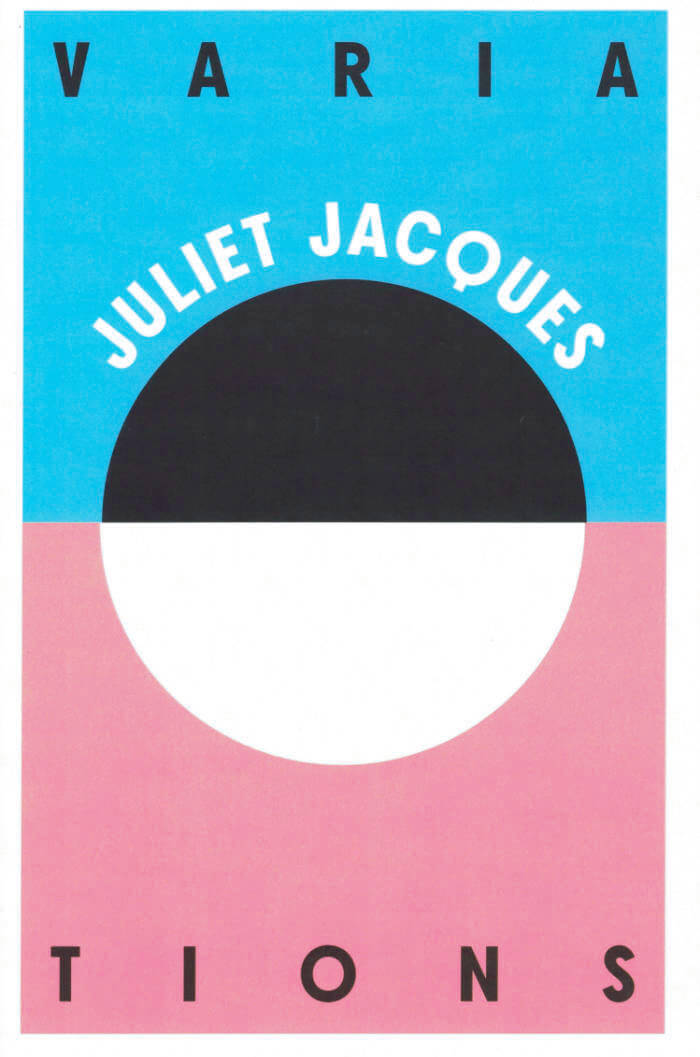
Variations
Variations is the debut short story collection from one of Britain’s most compelling voices, Juliet Jacques. Using fiction inspired by found material and real-life events, Variations explores the history of transgender Britain with lyrical, acerbic wit.
Variations travels from Oscar Wilde’s London to austerity-era Belfast via inter-war Cardiff, a drag bar in Liverpool just after the decriminalisation of homosexuality, Manchester’s protests against Clause 28, and Brighton in the 2000s. Through diary entries of an illicit love affair, an oral history of a contemporary political collective; a 1920s academic paper to a 1990s film script; a 1950s memoir to a series of 2014 blog posts, Jacques rewrites and reinvigorates a history so often relegated to stale police records and sensationalist news headlines.
Innovative and fresh, Variations is a bold and beautiful book of stories unheard; until now.

Les Matières de la nuit
« Et ensuite quand le calme est revenu, plantez à la place une femme noire qui lève le poing, même un instant, comme pour faire semblant. Une femme noire fera le job, avec le poing levé, c’est mieux, c’est cool. » Écho ou fantôme de Suites décoloniales, ce recueil de poésie prolonge et complète les chemins parcourus par Olivier Marboeuf dans son essai, au moyen de ce que l’auteur appelle une « pratique théorique de la poésie ».
Fragments de mauvaises rencontres, haïkus sur le beat accéléré d’un train, hommages à la banlieue chérie, Olivier Marboeuf se fait conteur polyphonique, poreux au monde et dépositaire des histoires étendues et vues dans de multiples nuits.

Vesicapiscis
Vesicapiscis details a poetics of self-reflection / self-projection. What cannot be defined is pulled into the body, examined, dissected, regurgitated. Its form is prodded and rearranged. Every word / phrase / sentence is suseptible to mutation. And these mutations inevtiably proliferate onto the speaker's tongues, their throat, deep into their nervous system. Language is a virus, and as such, it must be studied.
Here we are, at the abyss.

Impossible Princess
Impossible Princess is the third collection of gay short fiction by PEN Award–winning San Francisco–based author Kevin Killian. A member of the “new narrative” circle including Dennis Cooper and Kathy Acker, Killian is a master short story writer, crafting campy and edgy tales that explore the humor and darkness of desire. A former director of Small Press Traffic and a co-editor of Mirage/Periodical, Killian co-wrote Jack Spicer’s biography, Poet Be Like God, and co-edited three Spicer books, including My Vocabulary Did This To Me: Collected Poems. His latest book, Action Kylie, is a collection of poems devoted to Kylie Minogue.

nnn2. - no no no celestial journal
published commonly, no no no expounds an experimental poetic offering, both text & art.
each issue features a limited edition artwork. which can be tacked or framed or stored in a drawer.
celestial in nature, no no no takes the form required, and necessary.

Wind & De wilgen - Wind & The Willows
Wind & De Wilgen (English/Dutch) was designed by Lawrence Weiner and published on the occasion of the execution of his work Wind & The Willows in the Openluchtmuseum voor beeldhouwkunst Middelheim, Antwerp.
Lawrence Weiner was an American artist and one of the central figures in the formation of conceptual art in de 60s. His work was strongly language-based and often took form in typographic texts, also visible in this artist book.
Edition of 1000 copies
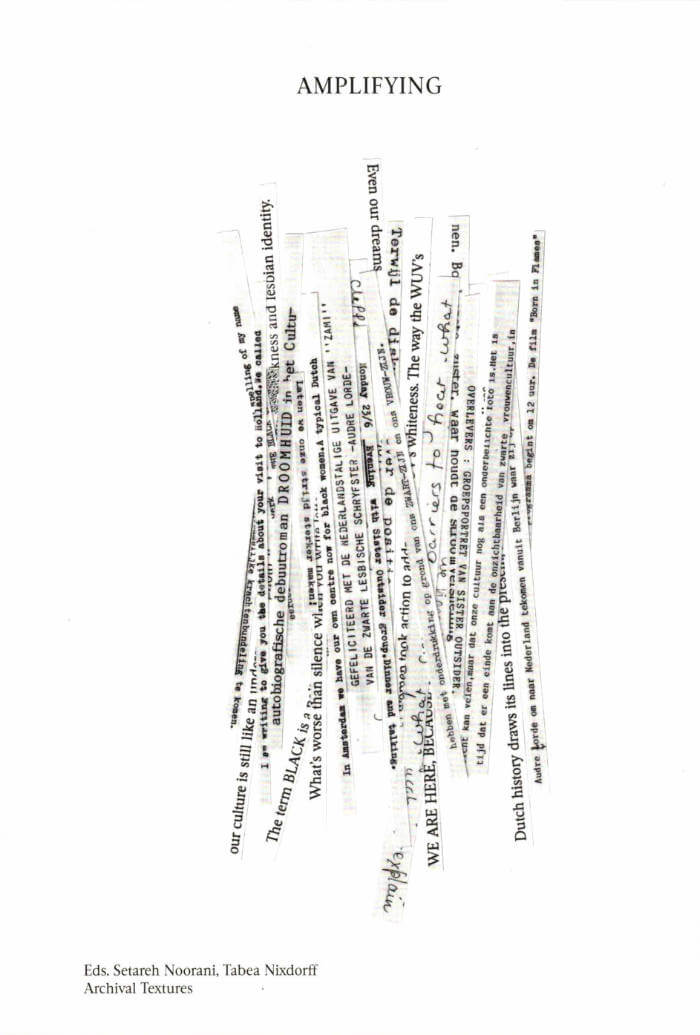
Archival Textures - Amplifying
Setareh Noorani, Tabea Nixdorff
The book Amplifying brings together written manifestations that trace the beginnings of Black feminism in the Netherlands. Amplifying means giving credit to, mentioning, over and over, and supporting the circulation of sources and authors that are formative for our thinking and practices. In the early 1980s, the political term “black” (zwart in Dutch) was introduced in the Netherlands to build alliances between women from different diasporic communities, who were faced with racism in their everyday lives.
Archival materials featured in this book include the original manuscript of the essay “Survivors: Portrait of the Group Sister Outsider” (1984), written by Gloria Wekker in collaboration with the Black lesbian literary group Sister Outsider, the seminal speech Statement of the Black Women’s Group (1983) by Julia da Lima, a contextualizing interview with Tineke E. Jansen and Mo Salomon (1984), excerpts from the book launch of Philomena Essed’s Everyday Racism (1984), and short texts authored by other Black feminist groups in the Netherlands, such as Zwarte Vrouwen & Racisme, Flamboyant, Ashanti, and Groep Zwarte Vrouwen Nijmegen.

Textdemic: A Retrospective on Jenny Holzer’s Laments
Textdemic | A Retrospective on Jenny Holzer’s Laments” Ed. by A.L. Steiner and GenderFail, a publication based on A.L. Steiner + Friends on Jenny Holzer at Dia Chelsea. This book is based on the Artists on Artists Lecture Series when the Dia Art Foundation invited Steiner to curate a public program based on a work of the artist's choice.
Steiner chose Jenny Holzer’s Laments and invited Morgan Bassichis, Riel Bellow, Gregg Bordowitz, Alexander Chee, Malik Gaines, Guadalupe Maravilla + Alexa Mishell Guillen, Lucas Michael, Eileen Myles and Pamela Sneed to present in Dia’s first in-person program after the Covid-19 pandemic began in 2021. This publication features records of the poems, lectures, and performances during this memorial program. The book's design plays homage to the 1990 Laments publication by the Dia Art Foundation.
For this publication, Steiner and GenderFail invited Matilde Guidelli-Guidi, Associate Curator at Dia Art Foundation and the organizer of the Artists on Artists Lecture Series, to write an afterword for the book. In this, she states: "Dispensing altogether with the monographic formula that characterizes the institution, for her Lecture A.L. Steiner convened a group of artists, writers, and activists to join her in responding to Jenny Holzer’s 1989 text-based installation, Laments. Holzer identified the thirteen texts that comprise Laments as 'voices of the dead,' a visual choir in response to the raging HIV/AIDS epidemic and government inaction. Over the protracted COVID-19 lockdown, Steiner developed the idea to organize an evening for the voices of the living to lament today's crises.”

Oslo National Academy of the Arts
Segunda Vez: How Masotta Was Repeated
Publication documenting the research made by Dora García for a video project on Oscar Masotta, pioneer of Lacanian psychoanalysis in Latin America and influential art critic.
It features a selection of Masotta's writings as well as contextual essays on his work.Segunda Vez is an art research project centered on the figure of Oscar Masotta (Buenos Aires, 1930, Barcelona, 1979), an author of groundbreaking texts about the Happening, art, and dematerialization, a pioneer of Lacanian psychoanalysis in the Spanish-speaking world, and a happenista. The project has yielded a full-length and four medium-length films by Dora García, two Cahiers documenting the research, and this book. Segunda Vez: How Masotta Was Repeated offers a selection of Masotta's writings, including his early study of Argentinean author Roberto Arlt, as well as texts that contextualize Masotta's thought and broaden the reach of his reflections on the intersections between performance and psychoanalysis, art and politics.
Edited by Emiliano Battista.
Texts by Dora García, Oscar Masotta, Roberto Bolaño, Jorge Jinkis, Inés Katzenstein, Ana Longoni, Emiliano Battista, Aaron Schuster, Julio Cortázar.
English edition
13,5 x 21 cm (hardcover)
320 pages (color & b/w ill.)

Koreografi
Koreografi / Choreography is a magazine initiated and edited by Solveig Styve Holte, Runa Borch Skolseg and Ann-Christin Berg Kongsness. The magazine consists of texts written by Nordic artists within the field of dance and choreography.

Verlag der Buchhandlung Walther König
Beyond Conceptual Art
Curator, writer and dealer Seth Siegelaub (1941–2013) is legendary for his promotion of Conceptual art in New York in the 1960s and ‘70s.
Acknowledging the unusual scope and essentially unclassifiable nature of his manifold interests and activities, this volume shows how Siegelaub’s projects and collections are underpinned by a deeper concern with printed matter and lists as ways of disseminating ideas. The book’s chapters explore the various facets of and connections in Siegelaub’s work, from his groundbreaking projects with Conceptual artists and his research and publications on mass media and communications theories to his interest in handwoven textiles and non-Western fabrics. It also highlights his collecting activity, which culminates in a unique ensemble of books on the social history of textiles and a textile collection comprising over 750 items from around the world. The survey also reflects on current practices through contributions by contemporary artists, such as Mario Garcia Torres and writer Alan Page, who co-created a new work inspired by Siegelaub’s bibliographic project on time and causality.
With essays by art historians and curators, a previously unpublished conversation between Siegelaub and artist Robert Horvit and an annotated chronology, this comprehensive survey pays homage to one of the most distinctive characters in 20th-century exhibition-making.

Le Dictateur #05 – FAQ
Myriam Ben Salah, Maurizio Cattelan
FAQ is an accordion-fold art publication edited by Maurizio Cattelan and Myriam Ben Salah and commissioned by Le Dictateur. Coinciding with the 10th anniversary edition of Le Dictateur, the first volume will expand into a yearly series.
FAQ stands for Frequently Asked Questions, referencing an attempt to synthesize a recurrent flow, a tenor, an ideal visual representation of a given and very subjective “now”.
Born out of an accute image eating disorder, FAQ reflects the mental assimilation of a relentless roving within physical and virtual art spaces: from galleries to tumblr accounts, museums, or artists studios; it can be seen as a portable exhibition, a show on paper, a project of restitution, a hybrid object that you can leaf and scroll through. Far from being a rational enterprise because of its lack of rules, hierarchy, order—or concept for that matter—it is expressly and brazenly as personal and biased as possible and reflects the obsessive mannerism of its authors.
Works by Korakrit Arunanondchai, Thomas Bayrle, Neil Beloufa, Judith Bernstein, David Douard, Carroll Dunham, Dan Finsel, Llyn Foulkes, Kathy Grannan, Camille Henrot, Charles Irvin, Elad Lassry, Jon Rafman, Steven Shaerer, Emily Mae Smith, Peter Sutherland, Slavs and Tatars, Andra Ursuta, Aleksandra Waliszewska, Charlie White, Jakub Julian Ziolkowski...
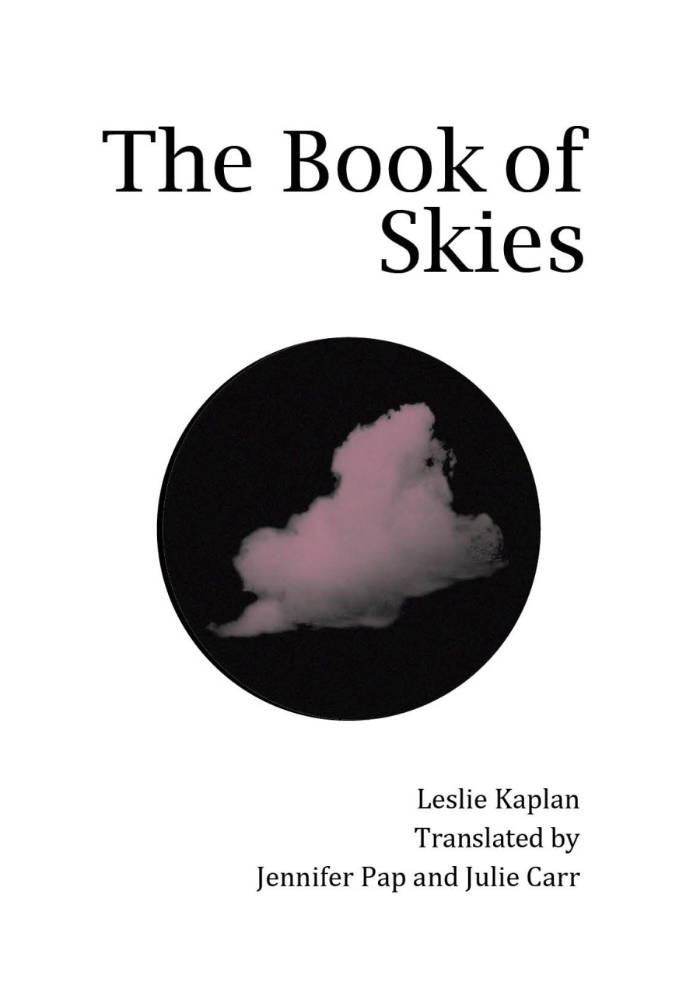
The Book of Skies
Leslie Kaplan, Jennifer Pap and 1 more
The Book of Skies, like its predecessor Excess-The Factory, emerged from poet Leslie Kaplan's experience participating in the national strike and social revolution of ’68 in France. Early in ‘68 Kaplan, like others, left her studies in order to take on factory work, as an aspect of revolutionary practice. Excess—the Factory, puts the factory experience strikingly on the page in sparse and original language. The Book of Skies takes place in the period just after the ‘68 events as the central speaker now observes the places, landscapes, and people surrounding and relying on factory production in French cities, small and large. As the poem’s speaker moves from site to site, she finds possibility within the social spaces of the market, the street, the café, and even the factory itself. While class and gendered violence threaten to shut down hopes for freedom and renewal, the sky, as reality and as figure, functions as an aperture, drawing our attention upward and outward, even or especially when domestic and work-spaces are most violent or suffocating.
From the beginning of her career, French poet, playwright, and novelist Leslie Kaplan has been an important writer of the French left. She has published over twenty books in all three genres, many of which have been translated into German, Swedish, Spanish, Danish, Norwegian, and now, English. Her first book, L'exces l’usine (1982), gained the attention of writers such as Marguerite Duras and Maurice Blanchot, and became an important book for the ‘68 generation. In 2018, Commune Editions published Excess—The Factory, translated by Julie Carr and Jennifer Pap. This was the book’s first translation into English, though it had been translated into five other languages.

Ethical Portraits: In Search Of Representational Justice
Ethical Portraits investigates the representation of the incarcerated in the U.S. criminal justice system. Through interviews, creative non-fiction, and cultural theory, Hatty Nestor deconstructs a range of different prison portraiture.
Prisons systematically dehumanise the imprisoned. Visualised through mugshots and surveillance recordings, the incarcerated lose control of their own image and identity. The criminal justice system in the United States does not only carry out so-called justice in ways that compound inequality, it also minimises the possibility for empathetic encounters with those who are most marginalised. It is therefore urgent to understand how prisoners are portrayed by the carceral state and how this might be countered or recuperated. How can understanding the visual representation of prisoners help us confront the invisible forms of power in the American prison system? Ethical Portraits investigates the representation of the incarcerated in the United States criminal justice system, and the state's failure to represent those incarcerated humanely.
Through wide-ranging interviews and creative nonfiction, Hatty Nestor deconstructs the different roles of prison portraiture, such as in courtroom sketches, DNA profiling, and the incarceration of Chelsea Manning. Includes a foreword by Jackie Wang.
Hatty Nestor is a cultural critic and writer, published in Frieze, The Times Literary Supplement, The White Review and many other publications. She is currently completing a PhD at Birkbeck, University of London.
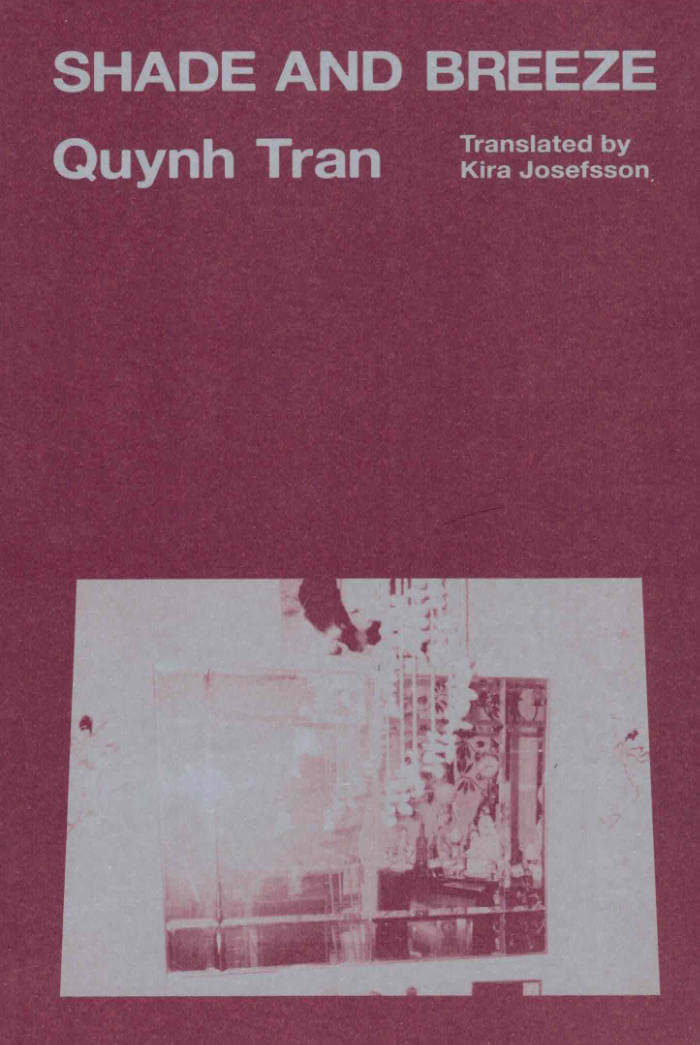
Shade and Breeze
Má dreams of wealth and grandeur, Hieu dreams of Finnish girls. The younger brother, always on the periphery, always an observer, gradually disappears into his schoolwork, mesmerised by his own intellect
The three of them form a solitary world in a small Ostrobothnian town on the west coast of Finland. Má and Hieu, constantly on a collision course with each other and the community’s suffocating social codes. They live among people who want to talk openly about everything, who don’t understand the necessity of sometimes remaining in the shade.
In sensitive and transfixing prose that has the effect of a series of tableaux, and with chapter headings reminiscent of the intertitles in a silent film, Tran’s multi-award-winning debut is a moving story about love, the compulsion to create, and the meaning of family.
Winner of the Runeberg Prize 2022
Winner of the Borås Tidning’s Debutant Prize 2022
Winner of the Svenska Yle Literature Prize 2021
Shortlisted for the Katapult Prize 2022

DOMMAGE#1
Edition of drawings, paintings and scans by Sophia Hamdouch, wrapped in a vinyl sleeve.